As Russia launched its full-scale invasion of Ukraine on Feb. 24, 2022, members of Ukraine’s parliament, the Verkhovna Rada, gathered for a plenary session and overwhelmingly approved the introduction of martial law. After the vote, it was also understood that domestic political divisions would be put aside until the end of the fighting. In many ways, that decision has paid off. Since then, public trust in President Volodymyr Zelenskyy has hovered at around 80 percent, and support for a fully functioning Ukrainian democracy has grown, according to a poll conducted by the Kyiv International Institute of Sociology and the National Democratic Institute in June.
But as Ukraine fast approaches its third year of all-out war, flickers of domestic politics have begun to reappear. That has created a new challenge for Ukrainian members of parliament who want to ensure accountability without undermining the war effort, at a time when support from Western allies is being thrown into question.
The most sensitive issue is corruption. In early October, a leaked U.S. strategy document stressed that graft was a danger to continued outside support for Ukraine. “Perceptions of high-level corruption could undermine the Ukrainian public’s and foreign leaders’ confidence in the war-time government,” the document reportedly stated.

